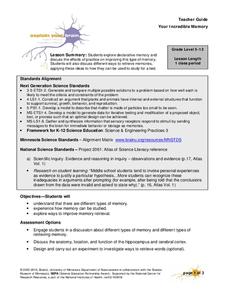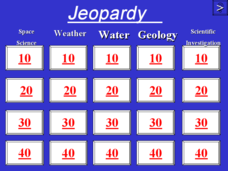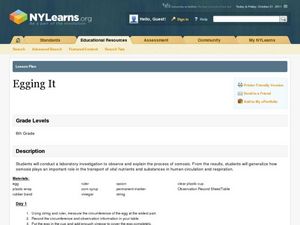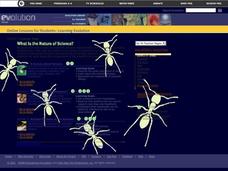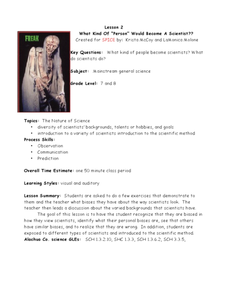Utah Education Network (UEN)
Microwave Magic
The microwave is a staple in many American households, but how exactly does it work? Approach this question from a scientific and practical standpoint, and discover cooking strategies, recipes, and methodologies for the standard microwave.
Mathematics Assessment Project
Middle School Mathematics Test 3
Real-life mathematics is not as simple as repeating a set of steps; pupils must mentally go through a process to come to their conclusions. Teach learners to read, analyze, and create a plan for solving a problem situation. The provided...
Teach Engineering
Study Design for Air Quality Research
Provide your class with the tools they need to design a research project. Groups examine case studies to gain information about the process involved in designing a research project. They use materials provided to brainstorm and develop a...
University of Minnesota
Your Incredible Memory
Test the efficiency of your memory! Scholars test each other's memory as they explore factors that affect memory retrieval. Through experimental analysis, they discover there are different types of memory, which has an impact on the...
EngageNY
Research Skills, Part 2: Natural Resource Development and How It Modifies the Physical Environment
Name your source. Scholars receive research folders with articles of information about natural resources. They use the sources to conduct research to answer questions about how Canada's environment meets the needs of the people and how...
Curated OER
Gallery Walk Questions on Rivers
A Gallery Walk is a technique that allows small groups to visit different stations, where they examine and discuss materials about an overarching topic. Questions about rivers and fluvial processes are available in this resource;...
Curated OER
Jeopardy - Earth Sciences
Questions about water, weather, geology, astronomy, and the scientific process make up this Jeopardy game. It is a pretty well-rounded set of slides, although you may want to be aware that a few of the questions are specific to the state...
Curated OER
SCIENCE ROLE PLAYS
Learners create a play in which each person in the group is a "character" or part of a system. In this creative lesson students are assigned a process in which they write a script about with characters.
Curated OER
Egging It
Sixth graders discover scientific processes by conducting an experiment in class. In this osmosis lesson, 6th graders utilize eggs, cooking ingredients, string and plastic cups to create an experiment in which they watch the exchange of...
Curated OER
What is the Nature of Science?
Students examine videos of field researach to discover the components of the scientific process. Using forms, they conduct community surveys about the nature of science. They research the extinction of dinosaurs and compare...
Curated OER
Shedding New Light
Students consider why photographs in space might not show stars and research the importance of light in this phenomenon. They research other scientific processes related to light or its absence and create "How It Works" posters about them.
Curated OER
Ancient Farmers of the Amazon
High schoolers read a sample research proposal and create their own. They discover the type of information needed for others to reject or accept the proposal. They practice applying the scientific process to different situations.
Curated OER
A Comparison of Polymeric Liquids with Newtonian Liquids
Students concretely illustrate and define a macromolecule, observe the unique behavior of polymers and relate to their knowledge of molecules, and use the scientific process to determine the difference between Newtonian and non-Newtonian...
Curated OER
The Urban Heat Island Effect - Lesson 2 (Grade 5)
Fifth graders use the scientific process to examine how when various surfaces are exposed to similar environmental conditions, surface temperatures may vary. They conduct an experiment to show the relationship between surface and...
Curated OER
Condensation
Students participate in the scientific process to investigate what happens to water when it evaporates by observing condensation. In small groups they observe what happens to ice in a cup, and what occurs when they hold a bowl of ice...
Curated OER
Don't Just Do It - Talk About It!
Students investigate a scientific problem while documenting their research with a video camera. For this scientific method lesson, students hypothesize over a science question and conduct an investigation to find an answer. Students...
Curated OER
Results and Conclusions
Fourth graders practice using the scientific method. In this results and conclusions lesson, 4th graders review data collected, create a graph of their data and make their final conclusions about the information collected.
Curated OER
What Kind of "Person" Would Become a Scientist?
"Scientist Stereotypes" could be another name for this lesson! Begin by drawing from middle schoolers' preconceived notions and media portrayal of scientists, and then explain that anyone can be a scientist. Even though there is an...
Curated OER
Tracing The Origins of Autism: A Spectrum of New Studies
Has the occurrence of autism increased over the years, or do the changes in diagnostic criteria account for the difference? High schoolers read an article about autism spectrum disorders and the related epidemiological studies that have...
Teach Engineering
See the Genes
"If you can't explain it simply, you don't understand it well enough" - Albert Einstein. The sixth installment of a seven-part series teaches young scientists about the importance of being able to communicate scientific research and...
Curated OER
Classification: Dichotomous Key
Young scholars investigate the classification process and nomenclatures used for classifying organisms. They study dichotomous keys to identify organisms with 90% accuracy. Students organize information regarding the relatedness of species.
Curated OER
Hibernation
Explain the process behind animal hibernation. This text-rich presentation provides clear information related to weather, animal behaviors, and their coping mechanisms.
Curated OER
Oil Spills: The Scientific Method in Action
Learners write a clear and detailed procedure and explore the complications in trying to clean the environment. They develop various ways to solve a complex problem. Students are cognizant of the effects of pollution on the environment....
Curated OER
Unit 3: Scientific Writing
Write-on! Demonstrate a writing model and support learners as they write an informational essay on a water resource issue of your (or their) choosing. The lesson plan provides a well-scaffolded summative writing experience that wraps up...





